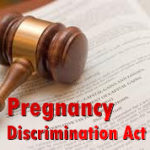 By Jim Cline and Erica Shelley Nelson
By Jim Cline and Erica Shelley Nelson
Representing the Injured or Disabled Member
Part 28: Pregnancy Discrimination and Disability Laws
This article is the 28th in a multiple part series covering the rights your injured and disabled members have and how you, as a union or guild representative, can best assist them. Over the several weeks and continuing for the next several weeks, we’ll be publishing, in various segments, information on how state and federal laws protect your members who are hurt or otherwise unable to work. We’ll cover topics including disability discrimination law, the FMLA, job protection rights under the CBA, workers compensation, disability benefits, and the right to bring a civil lawsuit.
The topics we are covering are addressed in detail in our newest book: HELPING THE INJURED OR DISABLED MEMBER: A GUIDEBOOK FOR THE WASHINGTON LAW ENFORCEMENT AND FIRE UNION REPRESENTATIVE. It is also our intention over the course of the next year to travel through the state and provide training to public safety union and guild representatives on how best to enforce these rights. Expect to hear more on that in the months ahead.
The 28th article in these newsletter series provides a discussion pother miscellaneous issues under the FMLA. For more information, visit our Premium Website . On the website you’ll find an on line version of the Injured or Disabled Member’s Guidebook and other information on the laws covering your members.
Under Baltimore employment law, pregnant employees have significant protection under the Pregnancy Discrimination Act (PDA) and the Family Medical Leave Act (FMLA). This section considers those rights below. The condition of pregnancy is accorded fewer protections under the ADA than the other statutes.
One major hurdle preventing pregnant employees from invoking the ADA is that pregnancy is not considered a disability. Although the ADA does not expressly exclude pregnancy from coverage, the implementing regulations do. The EEOC, in its adoption of the interpretative regulations implementing the ADA, stated that pregnancy is not a disability and, as a direct result, is not covered by the ADA.[106] The federal courts have concurred, primarily because they have looked to the EEOC’s interpretations for guidance.[107]
But pregnant employees invoke ADA if they develop pregnancy-related medical complications, assuming that that these complications would themselves be considered disabilities under the ADA. Back pain or high blood pressure are examples of pregnancy-related conditions that may be covered under the ADA. Both the EEOC [108] and the federal courts [109] specifically agree with this conclusion.
On the other hand, the mere presence of an impairment, however, does not automatically mean that an employee has a “disability” as defined under the ADA. This question, instead, will turn on whether the impairment substantially limits, or is regarded as substantially limiting, a major life activity.[110] For these reasons, a pregnant employee seeking protection of disability law would be far more likely to invoke the more liberal protections of the WLAD.
In the next article in this series, we’ll outline the elements of the ADA and PDA and how they interact.
______________________________
[106] Appendix to Part 1630 — Interpretive Guidance on Title I of the Americans with Disabilities Act, ADA Manual, 70:0109. (“It is important to distinguish between conditions that are impairments and physical, psychological, environmental, cultural and economic characteristics that are not impairments. . . . . Other conditions, such as pregnancy, that are not the result of a physiological disorder are also not impairments.”)
[107] Byerly v. Herr Foods, Inc., 2 A.D. Cas. (BNA) 666, 669 (E.D. Pa 1993) (Holding ADA “clearly indicates that pregnancy was not to be considered an impairment covered by the Act.”); Gabriel v. City of Chicago, 9AD Cas. (BNA) 483, 488 (N.D. Ill. 1998) (holding pregnancy, absent abnormal or unusual circumstances, is not a disability).
[108] EEOC: Definition of the Term ‘Disabilty’, ADA Manual, 70:1137.
[109] Cerrato v. Durham, 5 A.D. Cas. (BNA) 1660 (S.D.N.Y 1996) (applying analysis that distinguishes between normal, uncomplicated pregnancy and complications arising out of pregnancy that, under certain circumstances, can constitute “disability” under ADA); Patterson v. Xerox Corp., 4 Cas. (BNA) 1602 (N.D. Ill. 1995) (holding contention that pregnancy-related severe back pain qualified as disability under the ADA sufficient to withstand motion to dismiss).
[110] ADA Manual, 70:1138.



